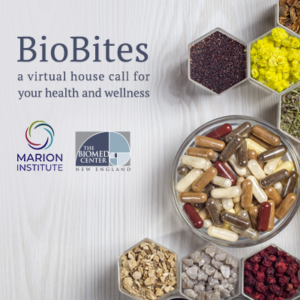Be a Smart Supplement Consumer
By Jaimie Dufresne, The BioMed Center New England
 It’s common nowadays to supplement diet with vitamins, minerals, and other building blocks for a healthy body. But not every supplement on the market today is both safe and effective. Between the over-abundance of options and the lack of information to aid in discernment, peace of mind can be hard to come by. Below are some tips to help you wisely select five of the most common supplements to meet your everyday needs.
It’s common nowadays to supplement diet with vitamins, minerals, and other building blocks for a healthy body. But not every supplement on the market today is both safe and effective. Between the over-abundance of options and the lack of information to aid in discernment, peace of mind can be hard to come by. Below are some tips to help you wisely select five of the most common supplements to meet your everyday needs.
Multivitamin. Most of us nowadays could benefit from a multivitamin each day. With a multivitamin, it’s important to select a well-rounded option that includes Vitamins A, C, D, K, and B vitamins. Oftentimes, vitamins are available in both methylated and non-methylated forms. For those who struggle with nutrient absorption, methylation can help increase the absorption of vitamins through the digestive process. When selecting a multivitamin, be on the lookout for “window dressing”, or the practice of including high-value nutrients in small, non-therapeutic doses to attract consumers. Buyers beware: it’s always better to select a safe and well-rounded multivitamin at the appropriate dosages than to try to cram too much into one pill.
Minerals. The human body requires both major minerals like zinc, selenium, iron, and chromium and trace minerals. Before the advent of industrial agriculture, humans were more likely to receive adequate mineral intake from the foods they ate. Industrial agricultural practices and the regular consumption of filtered water means that fewer of these nutrients are readily available to humans through more traditional means. Compounding the problem, the body doesn’t do a great job of storing minerals. For all of these reasons, a mineral supplement can be quite beneficial. Because minerals have a distinct taste, they’re commonly diluted and flavored. It’s important to be mindful of the additives that manufacturers put into mineral supplements to make them more palatable. Make an effort to find one that doesn’t include a lot of artificial ingredients and keep an eye on sugar content.
Fish oil. Fish oil confers many benefits; but at the end of the day, it is also susceptible to the risks posed by consuming fish in other forms. Therefore, when selecting a fish oil, there are a few things to keep in mind. When possible, purchase fish oil that has been sourced sustainably. Do a little homework on the company, making sure that they store their product properly and are transparent with their testing. Don’t sacrifice quality for cost. It costs money to produce a quality fish oil. That investment, however, ensures the absence of mercury and other heavy metals as well as phthalates in the end-product. It’s also important to consider the production processes used by the manufacturer. Cold pressed oils are preferred to those produced with heat, especially because Omega-3 fatty acids are susceptible to rancidity. Finally, check the ingredients in the fish oils you’re evaluating. Be on the lookout for additives, including hydrogenated oils, like soybean oil, which are frequently added to extend shelf life. For those looking for brand recommendations, Nordic Naturals and Genestra are two companies who have a reputation for quality fish oil products.
Probiotics. Probiotics are showing up everywhere these days, which means that there are a lot of new kids on the block. With probiotics, finding reputable companies is important; and one of the best ways to do that is to find companies who specialize in the manufacture of probiotics. When it comes to strains of probiotics, it’s generally beneficial for the microbiome to choose a multi-strain product – one that includes 5 or 6 different strains – and to rotate over time to support the diversity of the microbiome. This may not be best, however, if working with a practitioner to address specific conditions with the use of probiotics; in this case, isolated strains may be recommended for their particular impact on the body. Another factor to be aware of with probiotics is refrigeration. Many products need to be refrigerated and will lose their potency if not stored properly. Similarly, do not use anything that’s expired. Fortunately, many probiotics are also available through dietary sources, like sauerkraut, pickles, kimchi, kefir, and kombucha. Consider adding a condiment-size portion of one of these to your meals throughout the day.
Protein powder. There are many types of protein powder on the market today, including many vegan powders. These include pea protein, pumpkin seed protein, chia seed, sacha inchi, and rice protein powder. Individuals who have sensitive stomachs are advised to choose a product that contains just one of these; rice protein powder and pea protein powder are generally recommended. With vegan powders, it’s worth looking for products that are non-GMO, glyphosate-free, or organic, as many companies use glyphosate to desiccate the legumes to reduce processing time. These products may cost a little more; but because the powder is concentrated, the upside is significant. Innate Response, as an example, is not technically organic but tests all products to ensure that they are glyphosate-free. With protein powders, it’s also important to keep an eye on additives and sugar content. Some powders can have up to 10-15 grams of sugar. When fruit, yogurt, and other products are added to these, it becomes easy for sugar content to sky-rocket. Whey powder is another popular product, though perhaps less suitable for those who are sensitive to dairy. Useful for muscle building, whey powder is best sourced from grass-fed cows and should not be subjected to heat-processing, which can denature the whey. As with vitamins, there is a lot of window dressing that happens with all protein powders. These are sometimes labeled, for instance, as ‘multi-mineral’. As a consumer, be vigilant about the products you select, and select those that are likely to offer you the maximum benefit to suit your nutritional needs.
Jaimie Dufresne, a veteran in the healthcare industry, is Manager of the Elements Store at the BioMed Center New England. To learn more about supplementation, join the Marion Institute live on Zoom with Jaimie Dufresne of the BioMed Center New England on Tuesday, September 7th, 2021 at 12pm ET. To register for this FREE event, visit bit.ly/sept7biobites












This Post Has 0 Comments